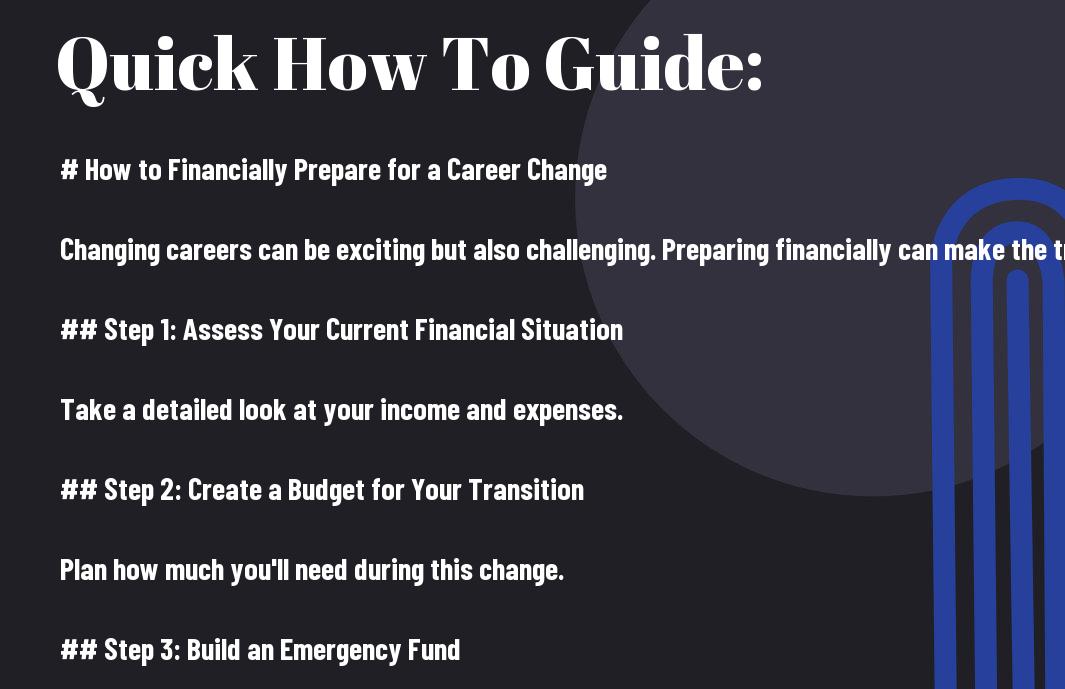Many people consider changing careers at some point in their lives. This decision can bring excitement but also brings financial uncertainty. To ensure a smooth transition, it’s important to plan your finances carefully. By understanding your expenses, setting a budget, and exploring income options, you can prepare yourself for this new path. In this guide, you will learn practical steps to help you financially prepare for your career change and set yourself up for success.

Key Takeaways:
- Build a budget to track your expenses and savings during the transition. This helps you stay on top of your finances.
- Save an emergency fund that covers at least three to six months’ worth of living expenses. This provides a safety net while you explore new job options.
- Research the job market in your desired field. Understanding salary expectations and job availability can guide your financial planning.

Understanding the Financial Factors of a Career Change
Your financial stability is a key part of successfully changing careers. Before taking the leap, consider these factors:
- Your current income vs. potential new income
- The cost of training or education for your new career
- Your savings and emergency funds
- Monthly expenses that need to be maintained
Recognizing these elements will help you plan effectively for your transition.
Assessing Your Current Financial Situation
Assuming you want to make a career change, start by assessing your current financial situation. Look at your income, expenses, savings, and debts. Create a budget to see where your money goes each month. This will help you understand how much you can afford to invest in training or education, and how long you can comfortably wait for a new paycheck.
Identifying Potential Income Changes
Financial factors play an important role when switching careers. You need to think about what your income might look like in your new job. Will it be higher, lower, or similar to what you earn now? Consider job availability and salary trends in your desired field.
Change may be rewarding, but it can also bring financial uncertainty. Research the average salaries in your new career path. Compare that to your current earnings. Factor in any potential job gaps during the transition. Understanding these possible income changes will prepare you for a smoother transition.
Setting Clear Financial Goals
It is important to set clear financial goals when preparing for a career change. These goals will help you understand your financial needs and guide your decisions during the transition. Start by assessing your current situation and determining how much money you will need to support yourself during this period. Whether you are saving for education, a new job, or a temporary gap in income, having clear objectives will make it easier to stay focused and motivated.
Short-term Goals Before the Transition
Little steps can lead to big changes. Before you make a career change, focus on short-term financial goals. This might include building an emergency fund, cutting unnecessary expenses, or paying off debt. Setting aside a few months’ worth of living expenses can give you peace of mind as you move forward in your new career. A practical target is to aim for three to six months of expenses saved up.
Long-term Goals for Stability
Short-term goals are vital, but don’t overlook your long-term financial stability. Goals for the future could involve saving for retirement, investing in further education, or even buying a home. These targets will provide you with a roadmap for your finances as you navigate your new career path. Aim to build a comprehensive plan that prioritizes your financial health and professional growth.
Goals need to be specific and measurable. Start by defining how much you want to save for retirement or what type of job training you need to advance in your new field. You might decide to save an additional 15% of your income for retirement or complete a professional course within two years. By setting these long-term objectives, you’ll create a sense of urgency that will help you stay focused on your career change while ensuring your financial future is secure.
Creating a Budget for Transition
Keep a close eye on your finances as you prepare for a career change. Building a budget will help you manage your money during this time. Start by listing your current income and expenses. This gives you a clear picture of where you stand financially. By tracking your spending, you can identify areas where you can cut costs, ensuring that you can cover any new expenses that come with your new career.
Estimating Expenses During Transition
Some expenses may pop up unexpectedly during your career change. Consider costs like training programs, travel, or new job-related tools. You might even have a gap in income, which will add to your expenses. To prepare, create a list of all possible costs and set aside funds to handle these changes. This way, you can maintain financial stability as you transition into your new career.
Adjusting Your Budget for New Career
Transitioning into a new career may require you to reshape your budget. You might encounter different income levels and expenses than what you’re used to. Your current budget may not fit well with your new job’s requirements or salary. Take time to review and adjust it accordingly. This could include revisiting your daily costs, savings goals, and setting aside funds for any additional training or certifications.
Your budget should reflect your new financial reality. Start by listing your new job income and any potential increases or decreases compared to your previous role. Be sure to account for new expenses related to your job, such as transportation costs, work attire, or self-employment taxes if you’re freelancing. Regularly updating your budget will help you keep your finances on track and enable you to adjust quickly if your situation changes.

Building an Emergency Fund
Once again, preparing for a career change requires financial planning. Building an emergency fund can provide you with a safety net during this transition. Aim to save enough money to cover three to six months’ worth of living expenses. This fund can help you deal with unexpected situations, such as job loss or medical emergencies, without added stress. Having this financial cushion can empower you to make career moves confidently.
Importance of Saving
There’s no denying that saving is a vital part of your financial well-being. An emergency fund ensures you have money set aside for unpredictable life events. When you face unexpected costs, this fund can keep you afloat. By saving consistently, you can reduce anxiety and focus more on your career change.
How Much Should You Save?
On average, financial experts suggest you aim for at least three to six months of living expenses in your emergency fund. This amount will vary based on your personal situation, including your job security and monthly bills. Calculate your vital costs, like rent, groceries, and utilities, to get an idea of how much you need to save.
Another good rule of thumb is to start small if saving a large sum feels overwhelming. Set a monthly savings goal that fits your budget. Over time, these smaller contributions can add up. As your career change progresses, reassess your savings goal. Adjust it based on your comfort level and changing expenses. Stay consistent, and you’ll build a strong emergency fund for your future.
Exploring New Income Opportunities
All career changes come with financial risk, but they also bring new income possibilities. Exploring various income sources can help you manage this shift smoothly. One way to boost your earnings is by seeking side gigs or freelance work. This extra income can be beneficial as you transition to a new career path. You can also look into upskilling through courses that enhance your qualifications, making you more attractive to potential employers. Your focus should be on opportunities that align with your new career goals and offer the flexibility to maintain your current job, if needed.
Side Gigs and Freelancing
Now, entering into side gigs and freelancing can be an excellent way to supplement your income as you launch on a new career. Many platforms, like Upwork or Fiverr, allow you to showcase your skills and connect with clients. You can pick projects that fit your schedule and interests, making it easier to balance both your current job and your new endeavors. This flexibility can give you the financial cushion you need during your transition.
Upskilling and Education Costs
Gigs often require new skills, so investing in your education is imperative. Upskilling can make you more competitive in the job market and even lead to better-paying positions in your new career. However, educational costs can add up quickly. It’s wise to research programs and consider options like online courses or community college classes that may offer financial aid. Budgeting for these expenses will help you avoid unnecessary stress while you expand your skill set.
Exploring different educational options is key to making a smart investment in your future. Many online platforms offer free and low-cost courses suitable for your career goals. You may also qualify for scholarships or grants, reducing your financial burden. Taking the time to weigh your options and understand the costs involved can help you make informed decisions about your upskilling journey. This foresight is imperative as you prepare financially for your career change.

Seeking Professional Financial Advice
To navigate a successful career change, seeking professional financial advice can be beneficial. A financial advisor can help you assess your current financial situation, plan for income changes, and create a budget that suits your new career path. They can also guide you through options like retirement savings and managing debt. With their expertise, you can make informed decisions that enhance your financial stability during this transition.
Finding the Right Financial Advisor
On your journey to financial preparedness, finding the right financial advisor is key. Look for someone with experience and credentials relevant to your unique needs. Ask about their services and fees, and consider reading reviews from other clients. Meeting in person can also help you determine if their approach fits your goals.
Understanding Different Financial Strategies
Financial strategies vary widely and understanding them can empower your decision-making. They may include budgeting methods, investment planning, and retirement savings options. Each approach has its benefits and can significantly impact your financial wellness as you transition into a new career.
This understanding allows you to tailor your financial plan. For example, if you’re looking for stability, a conservative investment strategy might work well. Alternatively, if you’re open to taking risks for greater rewards, consider a growth-focused approach. A financial advisor can help you identify which strategy aligns best with your goals and comfort level, ensuring you stay on track during your career change.
Final Words
Presently, as you consider a career change, it’s necessary to have a solid financial plan in place. Take the time to evaluate your current expenses, save an emergency fund, and explore new job opportunities thoughtfully. Paying attention to these areas can make your transition smoother and less stressful. For more detailed guidance, check out these 7 steps to help you prepare financially for changing jobs. This resource can guide you through each financial aspect of your career shift.
FAQ on How to Financially Prepare for a Career Change
Q: What is the first step I should take to prepare financially for a career change?
A: The first step is to assess your current financial situation. Take a close look at your income, expenses, and savings. Create a budget to see how much you can save each month. This will help you understand how much time you have to make the transition.
Q: How much money should I save before making a career change?
A: It’s wise to have at least three to six months’ worth of living expenses saved. This safety net can help you cover bills while you search for a new job or take time to acquire new skills. If possible, aim to save more if you plan to leave your current job before finding a new one.
Q: Should I consider going back to school or taking courses during my career change?
A: Yes, furthering your education can be valuable. Research the skills needed in your new field and identify courses or certifications that can help. However, don’t forget to factor in the cost of these courses into your budget. Look for online options that can fit your schedule and save money.
Q: How can I reduce expenses while preparing for a career change?
A: To reduce expenses, review your monthly spending. Cut back on non-vital items like dining out, subscriptions, and entertainment. Small changes can add up quickly. Consider ways to earn extra income, like freelancing or part-time work, to bolster your savings during this transition.
Q: What should I do if I am worried about not finding a new job quickly?
A: It’s normal to feel anxious about job hunting. To ease your worries, build a strong network by connecting with people in your desired field. Use LinkedIn and attend industry events. Additionally, work on your resume and practice interview skills. The more prepared you are, the more confident you will be in your job search.
Key Takeaways
- Assess your finances and create a budget to understand your savings needs.
- Aim to save three to six months’ worth of living expenses before transitioning.
- Consider further education or training but budget for these expenses.
- Reduce non-vital spending and look for extra income sources.
- Build a network and prepare carefully for your job search.
By following these steps, you can financially prepare for a successful career change with confidence and ease.




